Here are a few French mysteries of late that have been haunting me.
1. When did everyone in my building decide to get a musical instrument? And why? Sometime around the end of September I began to hear someone practicing a clarinet. The next day, someone in a different apartment started playing the violin. The day after that, someone took up the piano. Are all my neighbors secretly members of the national orchestra? Does this have something to do with the cooling weather? Is it an autumn ritual? Do the French just wake up the first crisp day of October, turn to their beloved and cry, "You feel that, honey? It's BASSOON weather!"
2. What do the concepts "Thanksgiving" and "Louisiana Cuisine" really have to do with each other?
3. Is it only Metro line #1 that always has a jazz band on it? And is it the requirement of every French jazz musician to learn the entire score for Porgie and Bess?
4. How is it that Paris has the most intense night culture, that it encourages and even hosts occasional all-night festivals, such as Nuit Blanche, for which crowds upon crowds upon crowds of young people appear, pushing and jostling, drinking and carousing, and it doesn't ever get out of hand?
5. Or am I wrong about that? Because why, coming back home at 2 a.m., is there almost always a police brigade cordoning off one or more of the tunnels in the Bastille station? And how scary is it to hear the sounds echoing out of that cordoned-off tunnel?
6. How is it that the French manage to be simultaneously the most polite and rude people I've ever met? The other day, I saw three teenagers rushing to give up their Metro seats to an old man with his little shopping cart. When he stumbled over one of them, they quickly stopped him from falling, righted him, then guided him gently into a seat. It wasn't just the care they took, it was the way they addressed him so politely, looking directly into his face as they spoke. Same thing the other week on the metro: a young girl, maybe about 13 years old, bumped into an elderly woman as she was making her way past her into the car. When she realized she did it, she turned around, cradled the older woman's elbow, and looked full in her face as she sincerely apologized to her. This happens almost daily. In a city of over 2 million people, it seems incredible that anyone would take the time to do this. Maybe I'm most touched by this because everyone drives in Utah, thus no one has to engage with other people at this almost molecular level. The kind of solicitousness I see here remains--for many Americans--sadly absent. Or perhaps I'm reacting to the way that people really look at each other when speaking. Regardless, every time this happens, I feel a tender rush of admiration for Parisians.
Which (7) quickly evaporates at the market, the Monoprix, or anywhere there is a line. Something happens to Parisians faced with a line. Geniality vanishes and suddenly these genteel folk become a sullen pack of space vultures suffering low blood sugar. On Sunday, I won't even go near a certain cheese seller in my neighborhood market because it's like Mean Girls meets 28 Days Later in there. Who knows why this is. Maybe it's some weird Catholic thing where on Sunday all Parisians have to give up patience.
8. Is my gym's Body Pump class really being taught by Mélanie Laurent? And if so, when did she develop that little problem she now has with amphetamines and Jon Bon Jovi?
9. Speaking of the gym, why will the French spend hundreds of thousands of dollars on upscale midcentury modern bathrooms, top of the line equipment (much better, I have to say, than anything I've ever seen in an American gym), fancy televisions, special multicolored strobe lights, sports instructors and a multi-floor dance studio and running complex, and NOT be willing to buy a single floor fan? Not, in fact, spend any money at all on a ventilation system, so that half an hour into any workout, everyone looks about to expire from heat exhaustion, because EVERY WINDOW BUT ONE is locked, and there are now 50 people crammed into a space slightly larger than a kindergarten classroom? I saw someone turning purple from body heat the other day. I'm not kidding you. PURPLE. And yes, maybe that person was me.
10. What exactly are the resources that Paris has for the homeless? The other day in Montparnasse, a very nice homeless man gave me a tour of a double decker bus decorated on the outside to look like a library, with a small area for coffee and cakes inside of it along with several small tables and chairs set up for other homeless patrons to play cards, sit and nap, talk, generally get out of the rain. The bus was so nice that at first I thought it was some sort of artist installation project but no, the man insisted, it was done by the city of Paris and it was one of a few around the city. Before Sean left Paris, he also saw a couple of police officers coming up to the homeless on our street, asking whether they needed anything: perhaps a cup of coffee, a coat, some food? Then, Sean told me, the police officer hurried off to go get these things. Still, clearly something more structural seems to be lacking, because there are whole families living on mattresses all around the Bastille, and now that the rains have begun, a small homeless village has camped out in my Passage. So what is the exact balance here between these elaborate, if perhaps primarily aesthetic, displays of generosity and a working infrastructure that aids the homeless?
11. Why does nearly every city block have a lingerie store, a boulangerie, AND a patisserie? How can there be that many people interested in buying lace panties, chocolate and unlimited carbohydrates on a regular basis? And how long, over time, can these three interests still successfully intersect?
12. How is it that every clothing store in France looks good? Even cheap clothing stores here are full of tasteful shirts and dresses and handbags: I have yet to find a store selling anything like velour hot pants with "Juicy" stenciled across the ass. And how is it that so much of the packaging of said goods is also so pleasing? The only place comparable to Paris for aesthetic presentation that I've experienced is Japan. Interestingly, the French seem to be obsessed with Japan, if the number of Mujis and Japanese tea houses and Japanese knick knack/pottery stores here is any indication. Merci, probably the prettiest department store ever invented, is chock-full of Japanese dishwares and stationery. And, amusingly enough, Japanese tourists. (Just not in the picture below.)
Actually, how is it that the presentation of anything--from a single macaron to a pair of jeans to a plate of andouillete sausage made from pigs' intestines (which I ate today: sometimes it's a good idea to look up the foods in your dictionary before you order them. That faint smell of shit wafting from the plate? There was a good reason for that) looks like Georgia O'Keefe just did a guerilla product staging? How much time do the French spend in a day making things look so nice? Is there a class they take on this in high school? Like, right after sex ed?
12.5: Exception to the rule, or maybe the rule-changer herself: the 60 year-old Helen Mirren look-alike wearing a "I heart Lindsey Lohan" t-shirt, walking down the Rue St. Denis.
13. Are French men actually that interested in shopping with their wives and girlfriends, or are they just better than American men at putting on a good front?
(Aside: On that note, I would like to applaud French men for their part in their culture's relentless aesthetic self-presentation. There's a little game I like to play here called "Gay or European?" where I try and guess the sexual proclivities of the men walking past me on the streets. Since I've arrived, I've only seen 8 men who I thought definitively were gay, and maybe 12 that seemed likely to be straight. The rest are so gleamy and tight-suited, I have no clue what they are. All of which makes me realize two things:
a) It's refreshing to live in a place where dress isn't so explicitly sexually coded, and
b) Anglo heterosexual men have to be the most hostile people on earth.
Because all this time they could be providing real visual pleasure to those around them--women and men both--but, out of laziness or maybe from some perverse paranoia about seeming NOT to be straight, they run around in baggy pants and thinning black thermasilk shirts with holes in them (yes, I'm talking to YOU, Sean. You are not and never will be a homophobe, but by God you are a sartorially lazy fuck. Now take the damn cashmere sweater I bought you off the dog!) and maybe, if they're feeling fashion frisky, wear tight polo shirts with a popped-up collar and a gray skull stenciled on the back atop a pair of acid-washed jeans with insanely thick white seams all over them, like some near-sighted kindergartner with a ball of white string decided to take up pants manufacturing for her class art project.
Really, when you think about it, how visually hostile ARE straight men in America? I'm beginning to think it's yet another way that patriarchy is killing us all.)
14. Why do the French love taxidermy so much?
I've never seen so many stuffed birds in my life. Is this a hangover from the days of corpse viewing at the Paris Morgue? Is this something they picked up from Flaubert, or was this particular cultural obsession his inspiration for "A Simple Heart"? I was talking to an American historian the other day who said her French boyfriend was writing a screenplay about two Parisian taxidermists who are best friends and rivals. "It's perfect," I told her. "It's SO French," she agreed. "The only problem is he doesn't know how to finish it." "That's easy," I replied. "The rivalry will get so intense that one of them will have to stuff the other." "Oh my God, that's PERFECT!" she shouted, and immediately texted him the suggestion.
I've begun taking a series of photographs of all the taxidermied animals I've come across in Paris. The one I wish I'd taken--but didn't; the store owner kind of freaked me out--was at a shop on the Boulevard St. Germain that had not only a stuffed bison in it, but a very postcoital-looking rabbit on its back holding a cell phone to its ear.
Just to let you know, I did ask this particular question of a Frenchman at a party last night, and he looked baffled. "Taxidermy?" he blinked genially. "I don't know what it is you are talking about."
So maybe it's just me who notices these things.
15. Who are the graffiti artists responsible for these art works?
The tetra-mosaics I've heard were done by a team of artists, though when I approached some of the waiters in Pause café about the one they had over their bar, they seemed not to know anything about it. "Don't know," the waiter shrugged. "In Paris, they are everywhere." Which isn't, strictly, true. I've been around a fair bit of Paris now, wandering the streets, picking a section of the city at a time to get familiar with, and these mosaics tend to be in the Marais and Bastille and some of the lower Rue de Rivoli areas. I've seen them around parts of the Latin Quarter and a bit further up, almost close to Belleville, but around the really swank areas of Paris, there are none to be found. This seems to follow the trend in Paris as a whole: the most tourist-trafficked areas are kept fairly clean, while the other sections of the city--particularly as they radiate out from the city center--become increasingly ramshackle, open to, er, revision. I have whole (digital) "rolls" of film on these artists now because I've become a little obsessed with them. They aren't particularly pleasing to look at, but they're comforting. It's like walking past someone you recognize from the grocery store or the office building day after day. They become--if not friends--the markers of friends. The sight of them draws the wide circle of this city, momentarily, tighter. I think this effect is enhanced for me by my lack of language skills. Or, more accurately, the kind of language skills that I possess. I can read French fairly well as I spend an hour or two a day at it, and I've become an obsessive sign reader. Which may be why I'm looking at graffiti. It's like one alien greeting another in the elemental language that they share. Interestingly, all these mosaics seem to be of little space aliens, which may also be why I'm drawn to them.
Regardless, this may be one mystery I don't want solved. I prefer stumbling across them as I do now. It makes me feel I'm engaged in a lengthy, though scattered, conversation.
Probably the only conversation I'll have with a French artist my entire time in Paris.
16. What am I doing with my time exactly? This is something that I was asked at the first of the American Historian meetings that I, not a historian, gate-crashed. I was asked this in particular by a woman from New York who seemed horrified both by the fact that I had no intellectual reason to be in Paris ("You don't work on anything French?" she shrieked), and by the fact that I have so many language problems ("You don't even speak French?" she shrieked again). (Question 16.5 Are academics specifically bred to make everyone else around them feel like dirt?) Anyhoo, after that great start, she immediately started asking me what I was doing here. Like, today, she pressed. What had I done today, for instance?
I thought of the morning sifting through half-finished drafts of poems, abandoning these for mint tea at the café, followed by an hour of vigorous yelling at my computer. Some compilation of restaurants I wanted to eat at. A nap. A long walk through Pére Lachaise.
"Oh, you know, the usual," I said, evasively. "I think there was a chocolate eclair in there somewhere."
The New York woman glared at me, and turned away.
17. Which leads me to my last mystery to be solved: what would you, dear reader, like to do yourself? I've already done Brian's dream, but what else do people feel like having me eat, read, experience for you? Write in. PLEASE. Because there are only so many hours of writing poetry, eating, napping and taking French classes (I start tomorrow!) that I can take. Another goal would be nice. Actually, any goal would be nice. I'll leave you to think about it. In the meantime, here are some other artists around Paris that have given me pause. Perhaps they'll give you pause, too. And maybe inspire you to ask a question of your own.
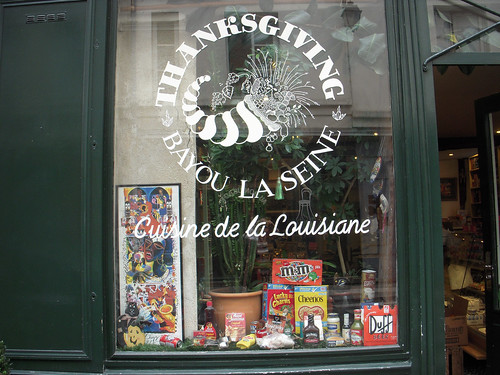
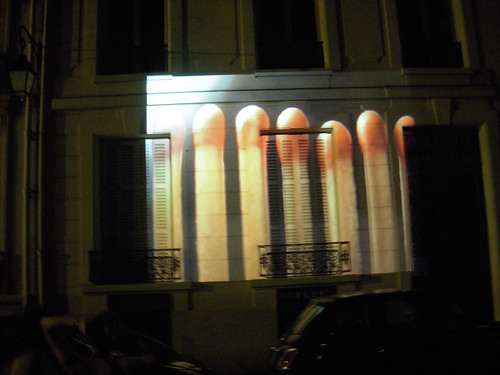

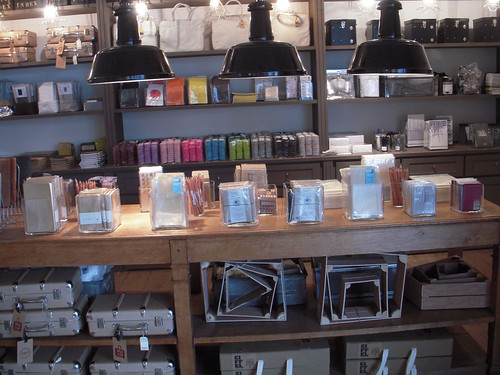

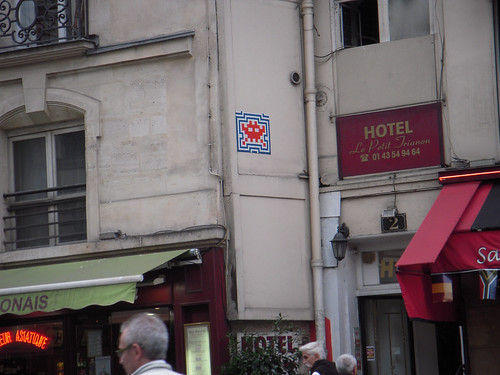
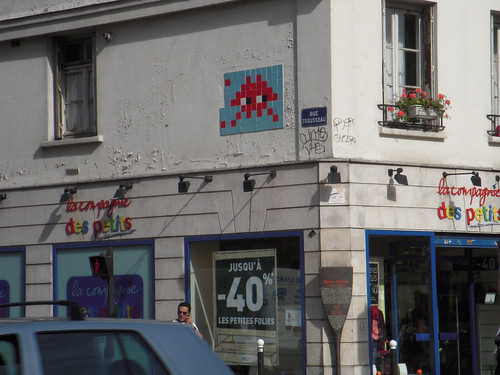
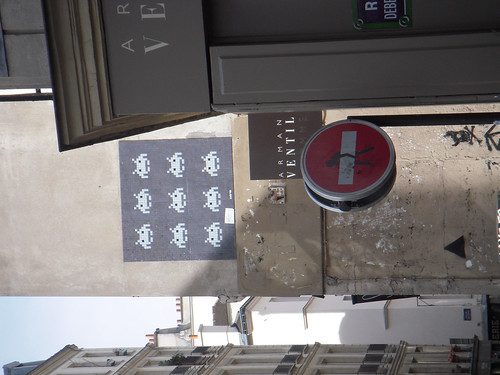


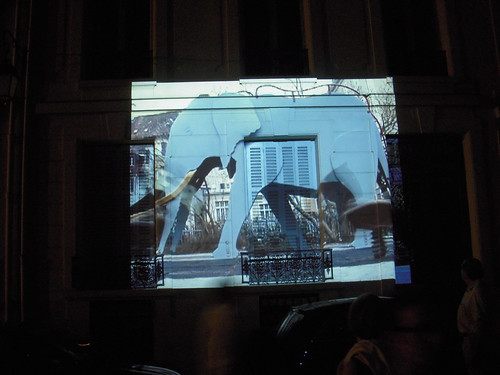
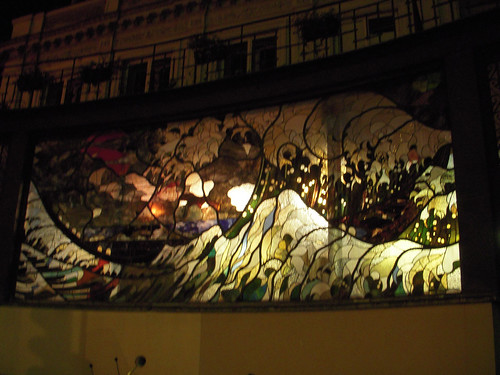
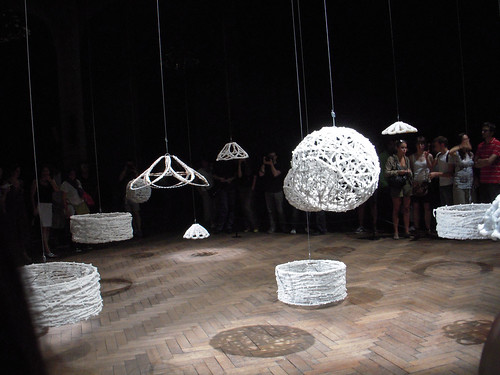
Do people, in general, seem comfortable with conversing with random strangers in Paris? Or do people mostly keep to themselves? I would love to hear more about interactions with people in multiple settings, even if the conversation seems dry. I particularly like hearing what older people have to say. It's interesting to see how their many experiences and perspectives during these shifting times have shaped them. But, of course, all sorts of people can be interesting in various ways. The story of the New Yorker woman is hilarious. And I really was really moved by the ways in which Parisians show respect and politeness to others. Incredible!
ReplyDeleteI have to admit, I really enjoy reading about your experiences in Paris. I took many french classes, but I've never been able to make it to France myself. Reading your posts though, makes me feel as though I'm building a sort of acquaintance, even if miniscule. Thank you! :)
Hmm. Forgive the wikipedia, but isn't your artist this person(s)? (don't look if you really don't want to know, but there is a fabulous meta-map speculation about the nonrandom locations.) I remember it from "Exit Through the Gift Shop"--with its own real, not-real issues.
ReplyDeletehttp://en.wikipedia.org/wiki/Invader_(artist)
Could you get really book nerdy for us and go to some place where the 19th century women writers would have gone? With their Baedeker's in hand. Louisa May Alcott? Or wherever Margaret Fuller met George Sand to talk over coffee? I don't know. I'm thinking out loud here.
(Jenny and I used to talk about a plan B life plan of taking women's book clubs to recreate nineteenth century writers' tours. Except I'd have to travel with book clubs. I'm not sure I could do that. Good thing Plan A is sorta working).
Elizabeth
Research in the BN. This will require getting a library card, but it shouldn't be too hard. Definitely an experience a visiting scholar/poet should have.
ReplyDeleteThis comment has been removed by the author.
ReplyDeleteGay-dar is definitely a culturally sensitive skill; by American standards, the British educated class would have died out long ago for lack of heterosexuality.
ReplyDeleteIn lieu of tonka beans, your Parisian charge will be the upcoming Fondation Cartier pour l'atre contemporain exhibit "Mathématiques--un dépaysement soudain" which opens 21 October. But not just the "beautiful elsewhere" exhibit: they are holding affiliated "Nights of Uncertainty" special events, details to be announced soon. Happy to have found this rather than send you to David Lynch's new night club there.